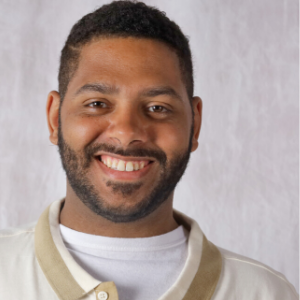Here in his own words, ACTLocal playwright Andrew Lee Creech tells us about his newest play, Last Drive to Dodge (which was recently workshopped at ACT). This play is part of a planned nine-play, multi-century-spanning cycle exploring the lives of Black Americans in pivotal moments of American history. He also talks about his inspiration, the writing process and what it’s like to work in these COVID times.
Don’t miss Andrew in conversation with director Valerie Curtis-Newton Thursday, January 28 at 7pm.
Tell us a story from your childhood or your past that explains who you are as a writer/artist and/or as a person.
When I was five years old, I drowned in a swimming pool. I died. Obviously, paramedics were able to resuscitate me, but what I take away from that experience is a sense of purpose. If I had no purpose here on this earth, I wouldn’t be here. So, if I’m gifted with the ability to tell stories and make people think, laugh and feel, that’s what I will do.
What was the inspiration for Last Drive to Dodge?
The play is set in 1880s Texas. Cowboys – this is arguably the most romanticized and whitewashed period of American history. I wanted to see more Black people living in those whitewashed periods. We existed. There are definitely stories to be told there. In particular, I wanted to see more Black love on stage. Also, with racial tensions reaching a boiling point this past summer, I saw and heard many utterances of phrases like, “second civil war.” I’m sure that that influenced me as well, given that I was in the middle of writing a play that was set during a time when Americans were dealing with the fallout of the Civil War, learning how to be with each other, and how to adapt to a changing world.
What’s your writing process like? Has there been a piece you are particularly fond of that has been difficult to write or to finish?
Once I have the idea for the play, my process usually starts with journaling, reading and research. From there, I’ll find a starting place, which is sometimes the beginning of the play, but other times it’s just a random moment that I know exists in the play. I’ll write that scene, and I’ll keep writing scenes while simultaneously developing an outline. These scenes and long monologues are used to discover more information about characters and plot. Sometimes scenes that I’ve written will be ripped apart, with bits being redistributed throughout the play in places that better serve the piece. The first draft usually ends up being ironically both under and overwritten, but serves as a wealth of information about the characters and the world they inhabit. My farcical musical JOURNEY WEST! The Legend of Lewis and Clark, was particularly challenging to write because of the massive amounts of historical information. It was difficult to find a balance between how much historical context is needed for the audience to understand and how much is needed to make the story work. I also was trying to decenter the two famous white protagonists in a story that was built around them. I found some new grey hairs after writing that show.
What’s it like working with Valerie Curtis-Newton?
Valerie is amazing. She’s an extremely generous person and artist. She asks questions, she makes offers, has astute observations and guides everyone in the room to be the best versions of ourselves. There’s always space in the room for a good laugh. And she always speaks truth. You gotta love somebody who speaks facts 24/7.
Do you miss live audiences and what do you find different about the virtual space as opposed to the in-person experience in these pandemic times?
I love the virtual space because you can eat snacks during rehearsal and feel no shame. Just shut off your camera. Jokes aside, there is a certain level of comfort that is afforded to you when you are able to work digitally and from home–especially for those of us who are more introverted and have a limited social battery. And it has the advantage of allowing folks who are separated by thousands of miles to come together. While workshopping Last Drive to Dodge, I got to reconnect with Mia Ellis and Ricardy Fabre, two amazing actors I met during the Seattle Repertory Theatre’s production of A Raisin in the Sun in 2016. I hadn’t had a chance to see them or work with them in four years, and now thanks to Zoom, they were able to participate in this workshop even though they live out of state. Having said that, I do miss the physical space. I wish I could’ve actually been in a room with the folks in the workshop. I wish we could given hugs and daps. And though watching two or more people attempting to forge a deep, intimate connection across space and over a screen is a fascinating experience. Nothing, in my opinion, beats face to face connection.
What skills are necessary for a playwright to possess?
Curiosity. About the world, about people, about soap, anything. But curiosity is key. Engage with the world around you. Vulnerability. Writing a play is like ripping yourself open and exposing not only the good parts of yourself, but your darkest, ugliest parts as well. You give your characters pieces of yourself, and your play tells people what you care about. You have to be willing to go to those places, tell your truths and then be vulnerable enough to share it. I would also say that consuming your medium is an important part of any artform. Reading and seeing plays is a great way to help yourself grow into a stronger writer.
Wine or chocolate?
YES.
The ACTLocal is brought to you by ACT in partnership with Trial and Error Productions.

